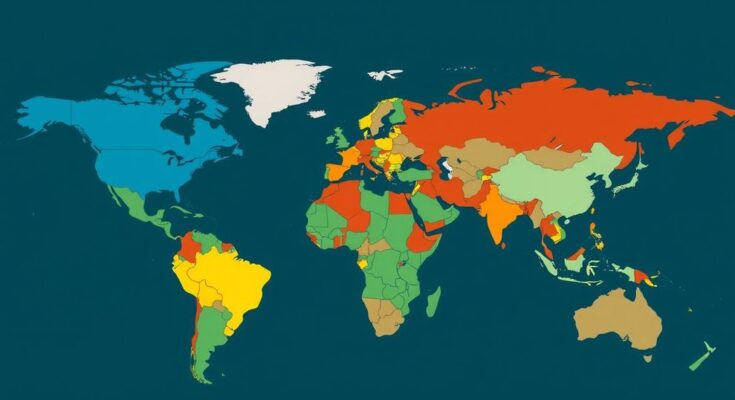Rich countries are initiating payment systems to compensate poorer nations for climate change damages, illustrated by Cyclone Freddy’s impact on Malawi, where survivors received cash grants to rebuild. This newly established funding, part of an agreement by developed nations, aims to address the losses suffered by low-income countries disproportionately affected by climate-induced disasters, although the amount pledged is deemed insufficient. The ongoing COP29 summit is negotiating further details on these compensation mechanisms, aiming for broader climate finance solutions.
In the context of climate change, a significant financial movement is emerging where wealthier nations are beginning to compensate poorer countries for the damages incurred as a result of climate-related disasters. A poignant example is the case of Christopher Bingala in Malawi, who lost his home due to Cyclone Freddy. Through a newly established funding initiative addressing “loss and damage,” he received approximately $750, enabling him to rebuild his roof over his family’s head.
This compensation stems from a pledge made by developed nations last year, creating a fund to mitigate losses faced by low-income countries disproportionately affected by climate change, despite having minimal contributions to global pollution levels. Currently, around $720 million has been committed by various nations, yet climate experts caution that this figure is insufficient given the escalating severity of climate-related disasters.
At the ongoing COP29 climate summit in Baku, Azerbaijan, discussions are underway to finalize the amounts owed to developing nations, focusing on a broader “climate finance” package that encompasses loans and investments. Philip Davis, Prime Minister of the Bahamas, expressed hope that wealthier nations recognize their responsibility in addressing the challenges faced by vulnerable communities.
Cyclone Freddy’s impact was devastating, displacing approximately 650,000 individuals in Malawi alone. For Bingala and his family, immediate survival was a challenge, with limited access to food forcing them to scavenge for sustenance. The cash payment they received offered a glimmer of hope, allowing them to relocate to a safer environment and rebuild. While challenges remain, Bingala is optimistic about his family’s future in a less flood-prone area, stating, “They are better off here because they are not in danger of the water challenges we had back in Makhanga.”
Scotland emerged as the first country to allocate funding specifically for loss and damage, with assistance distributed by the non-profit organization GiveDirectly to nearly 2,700 affected families. The funding provided families with a crucial safety net, addressing urgent needs and promoting recovery efforts. This initiative represents a pilot program for broader measures to support low-income households globally, highlighting the vulnerability of those least responsible for the climate crisis.
The need for substantial loss and damage funding continues to grow as extreme weather events proliferate, amplifying financial burdens on nations that are often already grappling with economic challenges. Prime Minister Davis noted the direct correlation between national debt increments and climate change, emphasizing the urgent need for more considerable contributions from affluent nations.
As the COP29 summit progresses, leaders are working to establish the framework for distributing the pledged funds while broadening the scope of climate finance to encompass disaster mitigation, cultural preservation, and addressing the adverse socio-economic impacts of climate change. Experts forecast the funding needs for loss and damage could surge to $250 billion annually by 2030, underscoring the imminent necessity for richer nations to act not only from a humanitarian perspective but as a matters of self-preservation, as climate refugees and environmental degradation transcend national boundaries.
The current discourse on climate finance is fundamentally rooted in the principle of reparative justice for countries bearing disproportionate burdens of climate change. As the implications of severe weather phenomena become increasingly apparent, low-income nations, who contribute minimally to global emissions, face significant challenges in adaptation and recovery. The international community, notably through events such as the COP29 climate summit, is now recognizing the need for structured financial assistance to address the urgent consequences of climate-related disasters, catalyzing the formation of loss and damage compensation funds. This funding initiative aims to allocate resources to vulnerable communities that lack adequate social safety nets, ensuring their sustainable recovery and resilience against future climate threats.
In summary, the emerging framework for climate change compensation is pivotal in addressing the disparities faced by impoverished nations in recovering from climate-induced disasters. The case of Christopher Bingala illustrates the profound impact of loss and damage funding, which is still in its nascent stages with $720 million pledged but yet to be fully disbursed. As discussions at COP29 progress, the need for enhanced financial resources to tackle the increasing frequency of climate-related challenges becomes vital, urging wealthier nations to embrace greater accountability for their emissions and the subsequent harms inflicted on vulnerable populations worldwide.
Original Source: www.wrvo.org




